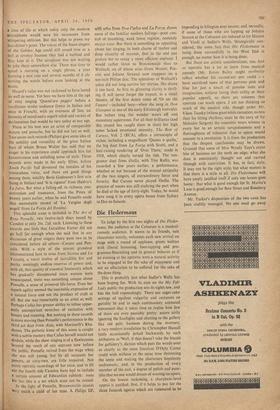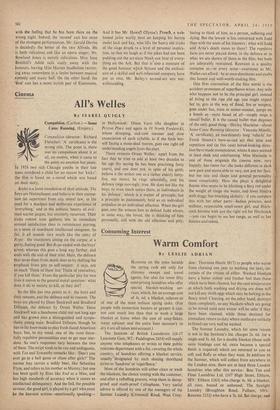Die Fledermaus
To judge by the first two nights of Die Fleder- maus, the audience at the Coliseum is a musical- comedy audience. It waves to its friends, eats chocolates noisily, welcomes each new arrival on stage with a round of applause, greets waltzes with liberal humming, foot-tapping and pro- gramme-flourishing and in general behaves as if an evening at the operetta were a natural activity to be engaged in for the sake of enjoyment and not an affectation to be suffered for the sake of the done thing.
This is probably just what Sadler's Wells has been hoping for. With its eyes on the My Fair Lady public the production sets its sights low, and hits the bull resoundingly. There are sugar-cake settings of opulent vulgarity and costumes so garishly lit and in such continuously animated movement that it takes time to realise how few of them are even passably pretty; actors airily ignoring the footlights and chatting to the gallery like old pals; business during the overture; a racy modern translation by Christopher Hassall (only occasionally jerked backwards by such archaisms as 'Well, if that doesn't take the biscuit for gallantry'); diction which puts the words over as clearly as the most fanatical D'Oyly Carter could wish without at the same time destroying the sense and making the characters hopelessly undramatic; and, in the production of every member of the cast, a degree of polish and punc- tilio that no one would dream of wasting on opera.
On the lowest reckoning, a charabanc-level appeal is justified; first, if it helps to pay for the three Janacek operas which are rumoured to be impending in Islington next season; and, secondly, if some of those who are lapping up Johann Strauss at the Coliseum are induced to try Mozart and Verdi at Sadler's Wells. Strategically con- sidered, the mere fact that Die Fledermaus is being done successfully in the West End is enough, no matter how it is being done.
But there are artistic considerations, too. Just as operetta has a lot to learn from musical comedy (Mr. James Bailey might profit/4 hly reflect whether his second-act sets could ::..t have sacrificed some of that parvenu pink and blue for just a touch of genuine taste and imagination, without losing their utility or their popular appeal), so there are volumes that operetta can teach opera. I am not thinking so much of the musical side, though under Mr. Vilem Tausky (whose giant white carnation, no less than his lilting rhythms, must be the envy of Sir Malcolm Sargent) the ensemble bears witness in every bar to an artistic scrupulousness and a thoroughness of rehearsal that in opera would amount to a revolution. It is from the production that the deepest conclusions may be drawn. Granted that some of Miss Wendy Toye's coyer bits of business set the teeth on edge; what she does is consistently thought out and carried through with conviction. It has, in fact, style. It may not be the right style, but what matters is that there is a style at all. Die Fledermaus will have amply justified itself if only one lesson goes home : that what is good enough for St. Martin's Lane is good enough for Bow Street and Rosebery Avenue.
Mr. Tucker's disposition of the two casts has been craftily managed. No one need go away with the feeling that he has been there on the wrong night. Indeed, the 'second' cast has some of the strongest performances. Mr. Gerald Davies is decidedly the better of the two Alfreds. He is both ridiculous and like an opera singer; Mr. Rowland Jones is merely ridiculous. Miss June Bronhill's Adele. sails easily away with the honours, leaving Miss Marion Studholme twitter- ing away somewhere in a limbo between musical comedy and music hall. On the other hand, the 'first' cast has a more stylish pair of Eisensteins. And it has Mr. Howell Glynne's Frosch, a web- footed jailer warily bent on keeping his hernia under lock and key, who lifts the hoary old tricks of the stage drunk to a level of personal inspira- tion, so that we laugh as if the jokes had not been padding out the act since Noah saw four of every- thing on the Ark. But that is'also a measure of the good humour which Strauss and the enthusi- asm of a skilful and well-rehearsed company have put us into, Mr. Bailey's second-act sets not- withstanding.







































 Previous page
Previous page